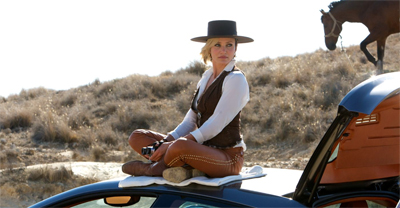There are two ways of looking at The Counsellor, both handily articulated by the movie itself.
At one point, two characters engage in an abstract conversation about grief. They speak on the phone about what it means to lose something that is irreplaceable, and what that does to a person. They speak in metaphors and lyrical turns of phrase, dancing around the issue at hand. One participant in the conversation recounts the story of Spanish poet Machido, who managed to channel his grief into beautiful and moving poetry. Poetry woven from misery and suffering, beautiful and yet torturous. Much like The Counsellor itself, a story about corruption and consequences and greed and wraith, articulated with thoughtful elegance.
At another point, one character regales another with a tale of his strange sexual misadventures. Awkward metaphors are used to describe exactly what went down, as the other character (and the audience) watch on in a state of awkward disbelief. Using surprisingly elegant language – never at a loss for words to describe a truly surreal turn of events – the storyteller crafts a stunning portrait of a bizarre encounter. Trying to make sense of it all, the listener articulates the thought running through the mind of most of the audience. “Why did you feel the need to tell me that?”
The Counsellor straddles both extremes almost recklessly, veering from a sophisticated and thoughtful moral tale into something grotesquely indulgent and almost distractingly oblique. During one conversation, the seductive Malkina asks her lover Renier how he sees things playing out. He can’t help but imagine two contrasting extremes. With just a hint of self-awareness, Malkina point out that there’s a middle that Renier just isn’t seeing.
Cormac McCarthy is a writer who works best in prose. His ideas are often difficult to translate to screen. While No Country For Old Men was adapted with considerable care and style, The Road suffered from the fact that McCarthy’s cold and rough rhetoric could not accurately conveyed as part of a post-apocalyptic film. The Counsellor is written by McCarthy itself, and the script occasionally struggles as the writer’s dialogue is brought to life.
For all the skill of the ensemble present, McCarthy’s dialogue never feels like two characters talking to one another. Instead, it feels like verbal dancing or even fencing – an exchange of blows and parries, subjects carefully avoided and metaphors carefully primed. The approach is heightened and almost stylised. “Don’t you think that’s rather cold?” Renier asks Malkina at one point, after she shares her own eloquent definition of the word “miss.” Without hesitation, Malkina replies, “I don’t believe the truth has a temperature.”
While McCarthy’s script is light on exposition, it is hardly subtle. We never find out exactly why our lead character became embroiled in the bungled deal that threatens to consume him, and the script relies a little too heavily on coincidence and contrivance, but McCarthy’s themes and ideas are never far from the foreground. People are predators, there’s no depth of depravity to which they will not sink. You can’t count on anybody.
“If you consider a friend to be somebody willing to lay down their life for you,” a wise character advises our lead, “then right now you don’t have any friends.” Greed is the most cardinal of sins. When somebody suggests that greed pushes people to the very edge, Renier corrects them, “That’s not what greed does; that’s what greed is.” Everything needs to be paid back in full. Another character advises our lead that he is approaching a crossroads, but he has no choice in the matter. “The choice was made long ago.”
To be fair, McCarthy’s work is often about contrasting the crude and filthy surroundings with the strange poetic rhythm of his dialogue. Even when describing the most grotesque and indecent of acts, all of his characters seem to effortlessly find the most nuanced and most specific of words to capture the meaning with utmost precision. One of the biggest problems with The Counsellor is the way that the film struggles with this understated sophistication, overplaying these beautiful exchanges.
At one point, the title character consults with a player named Westray in a seedy dive bar. The pair are having a conversation laced with meaning and subtext – something the script for The Counseller does best. Constantly afraid of being recorded or observed, the characters meticulously avoid offering any direct warnings or advice, speaking in playful riddles and cautionary tales. “That’s a good word,” Westray repeats. “Cautionary.” At that point, Daniel Pemberton’s score surges, and any hint of subtlety is eroded.
There are several moments in The Counsellor where it seems like the movie is almost afraid to let McCarthy’s dialogue speak for itself – which betrays a pretty severe misunderstanding of how McCarthy’s dialogue works. McCarthy’s dialogue might be laden with symbolism and imagery, but it’s certainly not understated. Instead of relying on the words and the actors to convey threats, Pemberton’s score is repeatedly amped up during otherwise intimate scenes – as if the movie is afraid that the audience might miss the fact that very unpleasant business is going down.
The Counsellor occasionally feels a little bit too slick and too stylish for its own good. It’s a thoroughly unpleasant and uncomfortable film, but it’s executed with quite a lot of style and flair – perhaps too much flair. Director Ridley Scott keeps us back a little bit too far from what is unfolding, and despite sterling central performances from Michael Fassbender, Javier Bardem and Brad Pitt, it never feels quite as raw and as intimate as No Country For Old Men, which covered similar thematic ground with more ruthless efficiency.
It doesn’t help that Cameron Diaz feels a little miscast as Milkana. It’s a bold and challenging role, one which plays very far from Diaz’s established screen persona. However, a lot of the script weighs rather heavily on the character of Milkana, and Diaz struggles with the rhythms of McCarthy’s dialogue and can’t seem to find the heart of her character. With Penelope Cruz wasted in a small supporting role, it’s hard not to wonder whether the production would have worked better by swapping the actresses’ roles.
Still, there is a lot here that is interesting and that is clever. When the dialogue is handled by competent actors and when the film refuses to overplay things, the script works quite well. There’s a lovely little scene between Dean Norris and John Leguizamo, for example, that perfectly captures the movie’s big themes without stressing them too hard. Pitt’s oily operator is a delightfully ambiguous character when the movie isn’t reminding us just how serious things are. As he’s demonstrated repeatedly, Michael Fassbender is brilliant at conveying a character who has been worn down by the world around him.
And while Scott’s direction is a little over-bearing in places, it does provide the requisite tension. Though he provides that tension by undermining quite a lot of McCarthy’s dialogue, there are some wonderfully tense sequences in the film. There’s a sense that any member of the ensemble could be killed at almost any moment – even in the middle of a philosophical phone conversation. McCarthy also manages some nice grim foreshadowing in that regard, which would almost be too on-the-nose, but plays to the heightened stylised aesthetic of the movie.
At the same time, the juxtaposition of the gritty on-the-ground smuggling operation with the sterile sophistication of the financial dealings behind it is effectively handled. Cutting from the abstract deal-making and number-crunching by men in fancy suits to the harsh day-to-day realities of the people shipping the cargo into the United States might not be subtle, but it works. It provides a nice demonstration of precisely the kind of world that our lead character is entering, much more viscerally than he would like to concede.
The Counsellor is an uneven mess of film. It’s all over the shop – it’s bizarre, absurd, over-the-top, grotesque, heavy-handed and over-wrought. But it’s also very much committed to these things. Scott’s direction might occasionally overplay McCarthy’s writing, but the film is completely invested in its own heightened reality. It seems aware of its excesses, and almost unapologetic about them. While this doesn’t redeem all the flaws with the film, it does lend the movie a bit of bite.
Filed under: Non-Review Reviews | Tagged: arts, brad pitt, cameron diaz, Conversation, cormac mccarthy, Counsellor, Daniel Pemberton, De optimo senatore, javier bardem, Malkina, McCarthy, Mexican, Michael Fassbender, no country for old men, ridley scott, Westray |




























You make some great points, especially about the score often removing any subtlety the film might have otherwise had.
Good review!
Yep. I liked quite a lot of the ideas and themes, but it just seems like Ridley Scott was the wrong director for a Cormac McCarthy film. (And, arguably, that Cormac McCarthy was the wrong screenwriter in bringing a story from Cormac McCarthy to the screen.)
I think both statements are likely true. McCarthy’s dialogue might work in a novel, but on the screen it is too long-winded.
Ithink I liked it more than you. Hope you read my review. http://moviesandfilm.blogspot.com/2013/11/the-counselor-review.html
Some very heavy stuff there. McCarthy is very much an anti-capitalist writer – greed and the consequences of greed are a recurring theme, and I think The Counsellor hits on that quite well. We never find out how our lead got involved, or why; the answer is obvious – he wanted more. The justifications are irrelevant. It doesn’t matter whether he wanted a new house, or a secure future, or even to take care of his soon-to-be-wife. He wanted money and that drove him to make terrible choices. When the film talks about the choice made along ago, it’s referring to a choice we don’t even get to see – it’s just treated as something so common that it didn’t even need to be mentioned.
Actually when he said “living is being in bed with you and all the rest is waiting’ was the clue. He was fed up with getting slime out of jail or defending them to preempt that.
Good spot! Thanks!